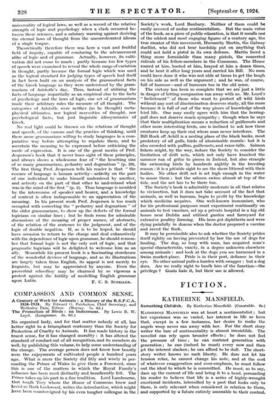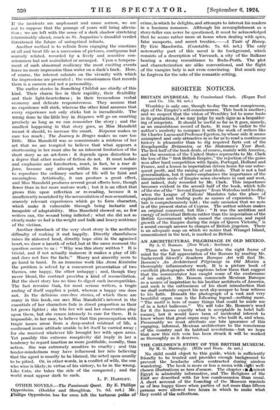FICTION.
KATHERINE MANSFIELD.
Something Childish. By Katherine Mansfield. (Constable. 6s.)
KATHERINE MANSFIELD was at heart a sentimentalist ; but her experience was so varied, her interest in life _ so keen that, except in a few instances, her desire to make the angels weep never ran away with her. For the short story writer the lure of sentimentality is almost irresistible. The novelist can rely upon broader effects ; he does not feel the pressure of time ; he can contrast generation with generation ; he can (indeed he must) every now and then let the interest slacken ; he can afford to be dull. The short- story writer knows no such liberty. He dare not let his tension relax, he cannot change his note, and at the cost of whatever exaggeration and over-emphasis, he must follow out the ideal to which he is committed. He must, so to say, dam up the current of life and bring it to a head, persuading his reader to believe that life is a series of highly-wrought emotional incidents, intensified by a past that looks only • to them, is only relevant when considered in relation to them, and supported by a future entirely amenable to their control,
If the incidents are unpleasant and cause sorrow, we are not to suppose that the passage of years will bring allevia- tion ; we are left with the sense of a dark shadow stretching interminably ahead, much as St. Augustine's dreadful verdict threatened the future of unbaptized infants.
Another method is to refrain from engaging the emotions at all and treat life as a succession of pictures, contiguous but scarcely related, recorded by a lively and sensitive con- sciousness but not assimilated or arranged. Upon a tempera- ment of such abnormal resiliency the most exciting events leave no more impression than water on a duck's back. Here, of course, the interest subsists on the vivacity with which the impressions are presented ; the consciousness that records them is a camera and not a personality.
The earlier stories in Something Childish are chiefly of this kind. Their charm lies in their rapidity, their flexibility and their light-heartedness ; in their tremendous verbal economy and delicate responsiveness. They assume that no experience will stick, whereas the other kind assumes that every experience not only sticks but is ineradicable. The wrong done to the little boy in Sixpence will go op smarting precisely as long as we can remember the story ; and the smallest happening in that story goes, as Miss Mansfield meant it should, to increase the smart. Sixpence makes us care too much ; The Journey to Bruges makes us care too little. Miss Mansfield was so consummate a mistress of her art that we are tempted to believe that what appears a shortcoming in her must also be an inherent limitation of the short story as an art-form : it depends upon distortion to a degree that other modes of fiction do not. It must isolate and emphasize and foreshorten, must, in fact, be a tour de force, because any attempt within its narrow compass to reproduce the ordinary surface of life will be faint and meaningless. Artistically, it can produce a great effect, and Miss Mansfield produces several great effects here, though fewer than in her more mature work ; but it is an effect that grows thin upon reflection or re-reading, because it is insufficiently nourished by the accumulation of non-sensational, scarcely relevant experiences which go to form character, which make it vulnerable through being inelastic and incapable of adaptability. Miss Mansfield showed us, as few writers can, the wound being inflicted ; what she did not so clearly make us feel is the weight and bulk and heavy sentience of the victims.
Another drawback of the very short story is the aesthetic diffieufty of making it end happily. Directly cheerfulness raises its abhorred head, directly hope stirs in the agonized heart, we draw a breath of relief, but at the same moment the question occurs to us : " Why was this story written ? It is trivial, and if not actually insincere it makes a play of life and does not face the facts." Misery and sincerity seem to go hand in hand. In an immense work like Anna Karenine the problem is solved by a concurrent presentation of two themes, one happy, the other unhappy ; and, though they never blend, the contrast provides a kind of reconciliation. But the short story has no time to digest such incompatibles. The fact remains that, for most serious writers, a tragic ending of itself supplies a point, whereas a happy one does not. In the delicious care-free stories, of which there are many in this book, one sees Miss Mansfield's interest in the essentials of her characters fade in direct proportion as their lot grows lighter ; she lets her wit and her observation play upon them, but she ceases intensely to care for them. It is impossible, in her case, to believe that this preoccupation with tragic issues arose from a deep-seated mistrust of life, a
confirmed ironic attitude unable to let itself be carried away ; for she received whatever life brought her with open arms.
Yet possibly this extreme receptivity did imply in her a tendency to regard inaction as more justifiable, morally, than action. She was extremely sensitive to cruelty ; and this tender-mindedness may have influenced her into believing
that the agent is-usually to be blamed, the acted upon usually to be pitied. Or, in other words, in a conflict of wills, the one
who wins is likely, in virtue of his victory, to be in the wrong. Like Cato, she takes the side of the conquered ; and the world must appear dark to such.
L. P. HARTLEY.







































 Previous page
Previous page